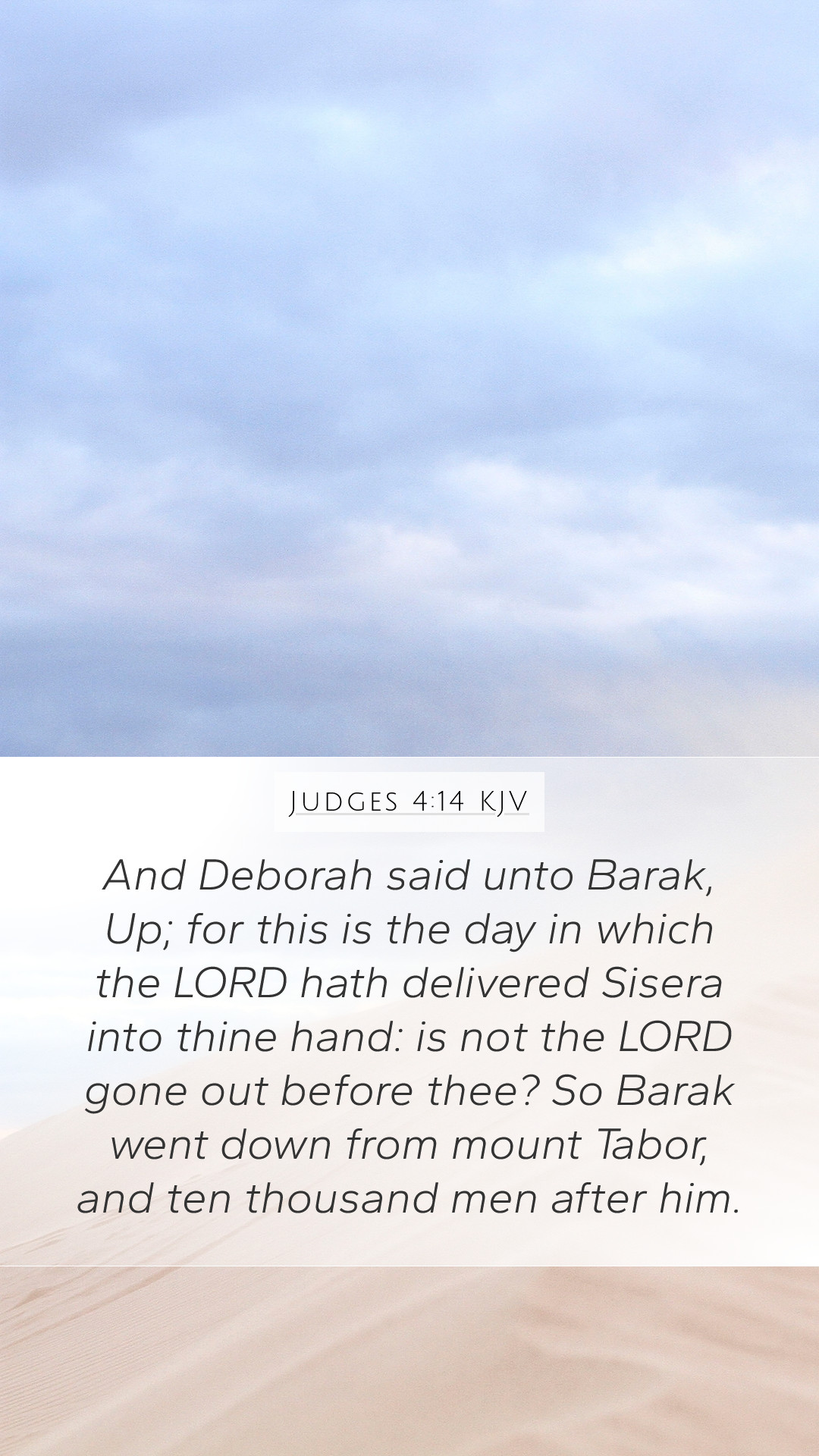Old Testament
Genesis Exodus Leviticus Numbers Deuteronomy Joshua Judges Ruth 1 Samuel 2 Samuel 1 Kings 2 Kings 1 Chronicles 2 Chronicles Ezra Nehemiah Esther Job Psalms Proverbs Ecclesiastes Song of Solomon Isaiah Jeremiah Lamentations Ezekiel Daniel Hosea Joel Amos Obadiah Jonah Micah Nahum Habakkuk Zephaniah Haggai Zechariah MalachiJudges 4:14 Meaning
What is the meaning of Judges 4:14?
And Deborah said unto Barak, Up; for this is the day in which the LORD hath delivered Sisera into thine hand: is not the LORD gone out before thee? So Barak went down from mount Tabor, and ten thousand men after him.
Judges 4:14 Bible Verse Meaning
Understanding Judges 4:14
Bible Verse: Judges 4:14 - "And Deborah said unto Barak, Up; for this is the day in which the LORD hath delivered Sisera into thine hand: is not the LORD gone out before thee? So Barak went down from mount Tabor, and ten thousand men after him."
Bible Verse Meaning and Interpretation
This verse is a pivotal moment in the narrative of Judges, illustrating the leadership of Deborah and the obedience of Barak. The context signifies a critical turning point for Israel as they prepare to engage their oppressors. Below is an analysis incorporating insights from esteemed public domain commentaries.
Key Themes in Judges 4:14
- The Role of Women in Leadership: Deborah serves as a prophetess and a judge, emphasizing the important role women can play in spiritual and national leadership.
- Divine Guidance: The assurance that God has gone out before Barak indicates His presence and support, crucial for the morale of the Israelite troops.
- Obedience and Action: Barak’s response to Deborah's command reflects a theme of faith in action; he moves forward with God’s command despite fears or uncertainties.
- Victory through God’s Power: The declaration that the Lord has delivered Sisera signifies the belief that victory in battles belongs to God, encouraging reliance on divine support.
Commentary Insights
Matthew Henry's Commentary: Henry underscores that Deborah’s words are not merely motivational but a prophetic declaration of God’s will. She acts as the mouthpiece of God, confirming His promise of deliverance, thus urging Barak to act decisively.
Albert Barnes' Notes: Barnes notes that the feigned assurance of victory is a critical aspect, emphasizing how Barak's faith was still mingled with uncertainty, as seen by his request for Deborah to accompany him. This reflects a human tendency to seek assurances in leadership and faith.
Adam Clarke's Commentary: Clarke highlights the strategic significance of Mount Tabor as a place of divine intervention, suggesting that its high ground was advantageous for the Israelite forces. He further emphasizes that the number of troops, though significant, relies fundamentally on God’s promise of victory.
Application and Significance
Judges 4:14 can be applied to contemporary Christian life by recognizing the importance of listening to God’s voice through His appointed leaders, understanding the synergy between faith and action, and relying on God’s promises in our endeavors.
In modern congregations, verses like this encourage discussions in Bible study groups and online Bible study platforms, where believers can explore themes of leadership, faithfulness, and God’s providence in overcoming adversities.
Cross References
- Judges 5:1-2 - The song of Deborah and Barak highlights the communal recognition of God's deliverance.
- Hebrews 11:32-34 - This passage celebrates the faith of various leaders, including Barak, emphasizing the significance of faith in action.
- Psalm 44:3 - Reflects the theme of victory coming from God's hand and not merely human strength, akin to the narrative in Judges.
Conclusion: The Importance of Judges 4:14 in Bible Study
Judges 4:14 serves as a powerful reminder of God’s guidance and the importance of faithful leaders in pursuing His purposes. Engaging deeply with this verse can enhance Bible study insights and support Bible study lessons that emphasize obedience and trust in divine authority.


